Kommando Spezialkräfte
Kommando Spezialkräfte (Special Forces Command, KSK) is an elite special forces military command composed of special operations soldiers selected from the ranks of Germany's Bundeswehr and organized under the Rapid Forces Division. KSK has received many decorations and awards from NATO, the United States and its affiliates. KSK operatives are frequently requested for joint anti-terror operations, notably in the Balkans and Middle East.
| Special Forces Command | |
|---|---|
| Kommando Spezialkräfte (KSK) | |
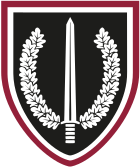 KSK unit badge | |
| Active | 20 September 1996 (Created) 1997 (Activated)–present |
| Country | |
| Branch | German Army |
| Type | Special forces |
| Role | Airborne operations Counter-Insurgency Counter-terrorism Covert Ops Direct Action Hostage Rescue High Value Targets/Manhunting Intelligence Operations Mobility Operations Unconventional Warfare |
| Size | ~1,300 authorized positions |
| Part of | Rapid Forces Division |
| Garrison/HQ | Calw, Baden-Württemberg, Germany |
| Motto(s) | Facit Omnia Voluntas (lat. The will is decisive)[1] |
| Engagements | |
| Decorations | Navy and Marine P.U.C. |
| Commanders | |
| Current commander | Brigadier General (Brigadegeneral) Markus Kreitmayr, since 2018 [2] |
| Notable commanders | Brigadier General (Brigadegeneral) Hans-Christoph Ammon |
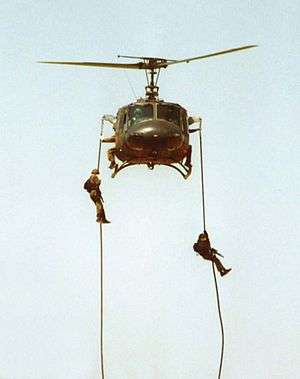
History
From 1973 until the KSK's formation in 1996, the West German (and later German) government assigned all counter-terrorist and special operations activities to the GSG 9, a highly trained police force created shortly after the hostage-taking that transpired during the 1972 Munich Olympic Games. Prior to 1973, the army's Fernspäher (Long-Distance Reconnaissance), the navy's Kampfschwimmer (Combat Swimmers/"Frogmen"), and (until 1989) the Special Weapons Escort Companies—Sonderwaffenbegleitkompanien[3] were the only military units comparable to anything that other nations may have seen as dedicated special forces units.
One politcial concrete reason for the establishment of the KSK was the fact that in 1994, during the genocide in Rwanda, German citizens had to be evacuated by Belgian para-commandos. The decision that this task was carried out by special operations forces of the former colonial power Belgium had been made in advance by mutual agreement between the NATO partners. The Federal Government of Germany also refused to intervene on its own, as in its view neither the GSG 9 nor the Bundeswehr "Bravo Companies" were trained to operate in a guerrilla situations and there was also a lack of the necessary transport capability. Several belgish para-soldies died at this operation. Due to the polictical pressure to have own forces ready for special operation within NATO became obvers.
Following the KSK's activation on April 1, 1997, all but one of the Fernspähkompanie have been either disbanded or merged into the newly constituted unit.
Like those of all German military units, KSK deployments require authorization from the German Bundestag (Federal Assembly). The unit has engaged in numerous anti-terror campaigns both in Europe and abroad; known engagements include operations inside Kosovo, Bosnia and Herzegovina and most recently in Afghanistan.
During the War in Afghanistan, although nominally under OEF command, the KSK worked under ISAF command since 2005, carrying out numerous operations in the vicinity of the German deployment in Kabul, including a successful raid on an al-Qaeda safehouse for suicide bombers in October 2006. KSK operators have commented in the German media about the restrictions placed on them by their national caveats and stated a preference for working directly for the Americans as part of OEF-A as they had done as part of Task Force K-Bar.[4]
As is to be expected with such units, specific operational details such as success and casualty rates are considered to be top secret and withheld even from the highest-ranking members of the Bundestag. This practice has elicited some serious concerns, resulting in agreement to increase both transparency and accountability, by disclosing mission details to selected members of the Bundestag, in relation to the future deployments of KSK forces.
On May 4, 2013 the KSK reported its first casualty. First Sergeant Daniel Wirth was fatally shot in Baghlan Province - Afghanistan during operation "Maiwand". US Army forces were part of the attempted rescue mission. Daniel Wirth was honored by his sister Kathrin Wirth-Torrente in a book titled "Brothers in Bravery". It not only tells her brother's story, but also reflects on 40 additional military members who lost their lives while fighting The Global War on Terror in the Greater Middle East. The book was published by the Travis Manion Foundation in September 2017.
Commanders
There have been eight commanders in the 20-year period since KSK was formed in 1996. They are as follows:[5]
- 1996–1998: Brigadier General Fred Schulz
- 1998–2000: Brigadier General Hans-Heinrich Dieter
- 2000–2003: Brigadier General Reinhard Günzel
- 2003–2005: Brigadier General Carl-Hubertus von Butler
- 2005–2007: Brigadier General Rainer Hartbrod
- 2007–2010: Brigadier General Hans-Christoph Ammon
- 2010–2013: Brigadier General Heinz Josef Feldmann
- 2013–2017: Brigadier General Dag Knut Baehr*
- 2017–2018: Brigadier General Alexander Sollfrank
- 2018–present: Brigadier General Markus Kreitmayr
*Brigadier general Dag Baehr has previously served twice as a field officer in the KSK: First, under the command of Brigadier General Schulz, when it was founded from 1996 until 1999 and then again between 2004 until 2007 under the command of Brigadier General Hartbrod.[6]
Structure
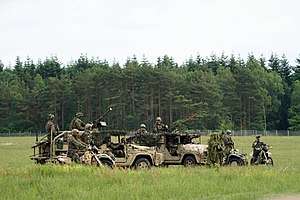
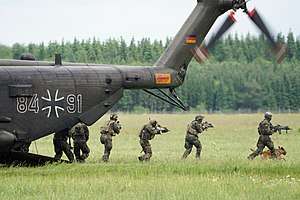
The KSK is a regular army unit at brigade level and (apart from the HQ and the Development Group) divided into two battalion-sized departments: Operational Forces and Support Forces.
Organisation
- Kommando Spezialkräfte
- KSK Staff
- Psychological Service
- Language Service
- Staff and Command Support Company
- 1st Commando Company
- 2nd Commando Company
- 3rd Commando Company
- 4th Commando Company
- Special Commando Company
- Special Reconnaissance Company
- Signal Company
- Support Company
- Quartermaster/ Handling Platoon
- Maintenance Platoon
- Parachutes/ Air Handling Platoon
- Medical Center
- Training Department
- Development Department
- KSK Staff
Operational Forces
Combat-ready units are divided into four Commando companies of approximately one hundred men. The Special Commando Company is normally staffed with veteran members, taking on various supporting roles. Each of the four Commando Companies has five specialized platoons, each with a unique specialty and ability that can be adapted to both the terrain and situation, depending on type action(s) required:
- Command Platoon
- 1st Platoon: vehicle insertion
- 2nd Platoon: airborne insertion
- 3rd Platoon: amphibious operations
- 4th Platoon: operations in special geographic or meteorological surroundings (desert, jungle, mountain or arctic regions)
- 5th Platoon: reconnaissance, intelligence operations and sniper/counter-sniper operations
There are four commando squads in every platoon. Each of these squads consists of four equally skilled members that have been hand-picked from the German Army into the platoon that best suits their abilities. Each squad member is specially trained as a weapons expert, medic, combat engineer or communications expert, respectively. Additionally, some groups may contain other specialists, such as a heavy weapons or language expert.
Support Forces
The HQ & Support Company is responsible for supply duties in Germany. For that, the unit is made up of:
- HQ Platoon
- Material Platoon
- Supply Echelon
- Catering Section
- Transport Platoon
- Ammunition and Refueling Platoon
The Signal Company consists of three signal platoons.
While the HQ & Support Company supports the KSK in Germany the Support Company takes supply duties during operations. Herefor, the company is organized in:
- Repair Platoon
- Supply Platoon
- Parachute Equipment Platoon
Selection and training
.jpg)
Initially, only officers and non-commissioned officers of the Bundeswehr could apply for service with the KSK and the subsequent evaluation period. As a prerequisite for entry, the Bundeswehr Commando Course (Einzelkämpferlehrgang) must have been completed by the applicant. Since 2005, however, applications have also been opened to civilians and enlisted personnel who must complete an 18-month Long Range Surveillance training cycle before the intense KSK selection process begins.
The selection process for the combat positions is divided into two phases: a three-week-long physical and psychological training regimen (normally having a 40% pass rate), and later a three-month-long physical endurance phase (normally with an 8–10% pass rate). During latter phase, the KSK use the Black Forest as their proving grounds for prospective operators. In this time, candidates must undergo a grueling 90-hour cross-country run, followed by a three-week international Combat Survival Course at the German-led multinational Special Operations Training Center (formerly the International Long Range Reconnaissance School) in Pfullendorf.
Upon successful completion of the selection process, candidates may be allowed to start their 2–3-year training cycle with the KSK. This training includes roughly twenty courses at over seventeen schools worldwide: in Norway for Arctic terrain, Austria for mountainous terrain; El Paso, Texas, or Israel for desert and/or bush training; San Diego for amphibious operations; and Belize for jungle experience.
According to press releases from May 2008, the Bundeswehr aims to advance the attractiveness of service in the KSK to women.[7] This is partially because the KSK was previously unable to reach its targeted number of troops.[8] The KSK was no longer restricted to male troops after the Bundeswehr opened all units to women in 2001. As of 2020 in KSK, women occupied auxiliary positions.[9]
Insignia
Beret and badge
Members of the KSK wear maroon berets as a symbol of their roots in airborne units. A metal badge is worn which consists of a sword surrounded by oak leaves. The flag of the Federal Republic of Germany is depicted on the bottom of the sword.
Kommandoabzeichen
The Kommandoabzeichen (commando badge) is a cloth patch worn on the right pouch of the uniform. The commando badge's design is similar to the metal badge worn on the beret. It depicts a silver sword on light green background surrounded by oak leaves. The badge was permitted to be worn in 2000 by Federal President Johannes Rau.
Waffenfarbe
KSK units wear green as their Waffenfarbe, similar to infantry units. Before becoming an independent military force, the KSK was a part of infantry units.
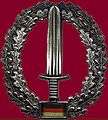 Badge worn on beret
Badge worn on beret Green Waffenfarbe worn by infantry units
Green Waffenfarbe worn by infantry units
Controversy
In 2018, the German Federal Criminal Police Office uncovered a plot involving unknown KSK soldiers to murder prominent German politicians such as Claudia Roth, Heiko Maas and Joachim Gauck among others, and carry out attacks against immigrants living in Germany.[10] Also, earlier that same year in a separate investigation, the State prosecutors in the city of Tübingen investigated whether neo-Nazi symbols were used at a "farewell" event involving members of KSK.[11]
References
- Reinhard Scholzen: KSK – Das Kommando Spezialkräfte der Bundeswehr, Motorbuch Verlag, Stuttgart 2004, ISBN 3-613-02384-9, S. 108
- "Vita Kommandeur KSK". German Bundeswehr (in German). Retrieved 2 February 2019.
- The eight platoons operated jointly with US forces under the command of SACEUR, e.g. the German army's 2./S.W.120 stationed in Werlte and the US AWSCOM (Advanced Weapons Support Command/59th Ordnance Group). The nuclear weapons had yields between 40 kt and 200 kt.
- Neville, Leigh, Special Forces in the War on Terror (General Military), Osprey Publishing, 2015 ISBN 978-1-4728-0790-8, p.142
- "Dag Baehr soll Chef der Eliteeinheit KSK werden" (in German). 4 March 2013. Retrieved 14 June 2016 – via Welt Online.
- "Startseite Heer" (in German). Retrieved 14 June 2016.
- Germany, SPIEGEL ONLINE, Hamburg. "Anti-Terror-Einsatz: Bundeswehr-Elitetruppe will Soldatinnen an die Front schicken". Retrieved 14 June 2016.
- "Frauen dürfen bald bei der KSK-Truppe Dienst tun" (in German). 20 May 2008. Retrieved 14 June 2016 – via Welt Online.
- "Kontext: Soldatinnen geschichtlich und weltweit." www.bundeswehr.de, Retrieved 18 September 2018.
- https://www.ynetnews.com/articles/0,7340,L-5398245,00.html
- https://www.dw.com/en/far-right-extremism-probe-into-elite-german-army-unit-opens/a-40138355
External links
| Wikimedia Commons has media related to Kommando Spezialkräfte. |
- KSK offalkräfte (KSK) at Sondereinheiten.de (in German)